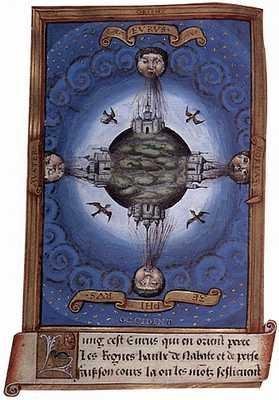- English 396A
- Junior Proseminar: Literature and Myth
- MWF 1:00-1:50. Professor Willard
- Junior Proseminar: Literature and Myth


The four winds according to Ovid (Metamorphoses, book 1)
Description: This junior-level proseminar introduces students to methods and materials of literary research. Content of individual seminars will vary, based upon instructor. Our section is devoted to mythological writing in English, from Elizabethans to Pulitzer and Tony award winners. Students will gain experience with a variety of reference sources, both online and in the library. Prerequisites: ENGL 373A and 380.
- Joseph Gibaldi, MLA Handbook for Writers of Research Papers, 6th ed. (MLA, 2003). ISBN 0873529863. Paperback $17.50.
- Ovid, Metamorphoses, trans. David Raeburn (Penguin, 2004). ISBN 014044789X. $11. Amazon $8.47.
- Seminar paper and presentation. 15 percent of course grade
- Research report and presentation. 25 percent
- Mid-term test 1. 10 percent
- Mid-term test 2. 15 percent
- Lab assignments. 15 percent
- Final exam. 20 percent
- Syllabus
- Week 1 (Jan. 10-12)
- Wed Introduction
- Fri Read prefatory material in Metamorphoses (pages ix-xli)
- Week 2 (Jan. 15-19)
- Mon MLK Day: No class meeting
- Wed Read Metamorphoses, book 1 (pages 3-44)
- Fri Peruse Gibaldi, esp. pages v-xv
- Week 3 (Jan. 22-26)
- Mon Read Metamorphoses, book 2 (pages 45-90)
- Wed Read Gibaldi, chapter 1
- Fri
- Week 4 (Jan. 29-Feb. 2)
- Mon Read Metamorphoses, book 3 (pages 91-128)
- Wed Read Gibaldi, chapter 2
- Fri Report proposal due
- Week 5 (Feb. 5-9)
- Mon Read Metamorphoses, book 4 (pages 129-71)
- Wed Read Gibaldi, chapter 3. Report proposal due
- Fri In-class exercise 1: William Golding and the daughters of Minyas
- Week 6 (Feb. 12-16)
- Mon Read Metamorphoses, book 5 (pages 172-207)
- Wed Read Gibaldi, chapter 4
- Fri First mid-term test
- Week 7 (Feb. 19-23)
- Mon Read Metamorphoses, book 6 (pages 208-45)
- Wed Read Gibaldi, chapter 5
- Fri Project 2 due. Comparison of two translations
- Week 8 (Feb. 26-Mar. 2)
- Mon Read Metamorphoses, book 7 (pages 246-91)
- Wed Read Gibaldi, chapter 6. Report outline due
- Fri Report outline due
- Week 9 (Mar. 5-9)
- Mon Read Metamorphoses, book 8 (pages 292-336)
- Wed Read Gibaldi, chapter 7
- Fri
- Spring Break (Mar. 12-16)
- Week 10 (Mar. 19-23)
- Mon Read Metamorphoses, book 9 (pages 337-79)
- Wed
- Fri Report draft due
- Week 11 (Mar. 26-30)
- Mon Read Metamorphoses, book 10 (pages 380-419)
- Wed
- Fri Second mid-term test
- Week 12 (Apr. 2-6)
- Mon Read Metamorphoses, book 11 (pages 420-61)
- Wed PowerPoint slides due
- Fri.
- Week 13 (Apr. 9-13)
- Mon. Read Metamorphoses, book 12 (pages 462-94)
- Wed.
- Fri. Research report due
- Week 14 (Apr. 16-20)
- Mon. Read Metamorphoses, book 13 (pages 495-545)
- Wed. Oral reports (10 mins. with PowerPoint slides)
- Fri. Oral reports continue
- Week 15 (Apr. 23-27)
- Mon. Read Metamorphoses, book 14 (546-91)
- Wed. Oral reports conclude
- Fri. TBA
- Week 16 (Apr. 30-May 2)
- Mon. Read Metamorphoses, book 15 (592-636)
- Wed. Review
- Exam Week (May 7-11)
- Mon. Comprehensive final exam (11:00-1:00)
Outcomes. To complete this course successfully, you must demonstrate understanding at least, and full achievement at best, of seven outcomes. They were framed by a committee of faculty who teach the course; numbers are for reference only and do not suggest relative importance.
- Make effective use of library resources at the University of Arizona and around the world, recognizing how information is organized and disseminated.
- Show familiarity with the major databases, essential reference works (such as concordances, dictionaries, and bibliographies), and scholarly articles and books in language and literature as well as related disciplines.
- Make correct, appropriate, and ethical presentation of research findings.
- Make fair representation of an author’s work, using paraphrase and quotation appropriately and documenting sources correctly.
- Summarize, evaluate, and critique secondary sources.
- Use primary and secondary sources to support original arguments in a variety of ways (e.g., as a point of departure, as theoretical grounding, as historical background, as evidence).
- Follow MLA guidelines for documentation and conventions (e.g., punctuation, subtitles, endnotes, bibliography), while sustaining a coherent and original argument about one or more texts.
Note: You demonstrate understanding and achievement of an objective by identifying and discussing successful examples from your graded course work. You demonstrate understanding only by identifying relevant examples from your graded course work and describing how you could make them fully successful. You do so in your portfolio of work from this and other courses.